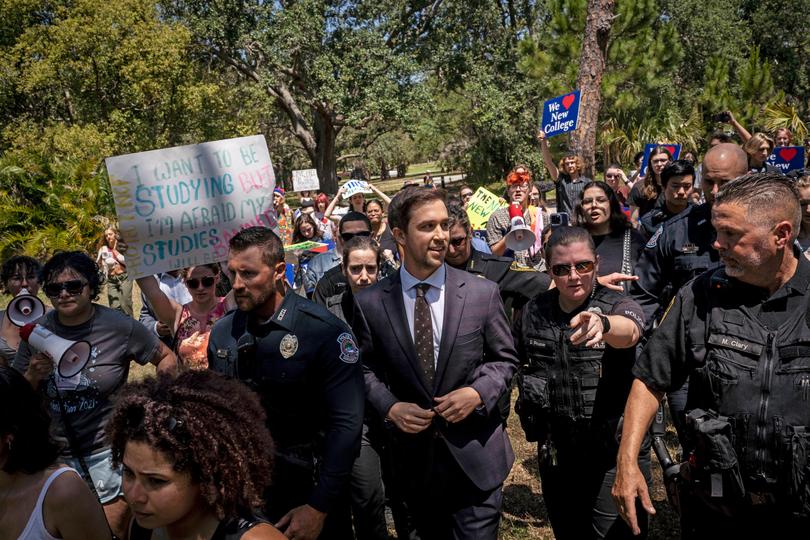JACKSON HEWETT: What happens to diversity, equality and inclusion when money, power and culture collide
JACKSON HEWETT: A former journalist’s crusade against inclusive practices in education wrote the guide for the new US administration, but will the world follow suit?

If you want to know what is happening with Donald Trump’s attack on diversity, equity, and inclusion (DEI), the playbook is publicly available.
Go to the Manhattan Institute’s website and look up Christopher Rufo.
Starting as a journalist documenting the rise of poverty in America’s Rust Belt, Mr Rufo concluded that “socialist intellectuals” were diverting funding from fixing homelessness to support the “compassion brigade’s” obsession with bias, inequality, and systemic racism.
Sign up to The Nightly's newsletters.
Get the first look at the digital newspaper, curated daily stories and breaking headlines delivered to your inbox.
By continuing you agree to our Terms and Privacy Policy.Rufo is a vehement critic of “critical race theory,” which purports systemic racism is embedded in laws, policies, and institutions, shaping social, economic, and political outcomes. He quickly became a darling of the right and was appointed to the board of trustees of the New College of Florida by Governor Ron DeSantis, where he fired the college’s diversity, equity, and inclusion office and proposed eliminating the gender studies department.
Rufo continues to write, and with articles such as “How the Left Hijacked America’s Institutions and Installed a New Bureaucratic Morality” and “How the Anti-Woke Movement Can Take the Moral and Linguistic High Ground”, he has laid much of the groundwork behind what we are seeing with Trump’s purge of DEI departments in the US Government.
In a more recent article titled “The Coming Fight to Abolish DEI”, Rufo had this advice in an open letter to Trump’s administration: strike an executive order “advancing the principle of colorblind equality” and “swiftly . . . shut down all DEI programs and to terminate the employment of all policy officials responsible for those programs, effective immediately.”
He also advised “acting quickly and aggressively on the first day, when the public is most willing to grant the new administration discretion,” and outwitting progressive media who would turn DEI into a negative news cycle via “speed and substitution,” ensuring policy was implemented in “single, rather than an ongoing, news cycle.”
That playbook is unfolding before our very eyes in the United States.
In Australia, Trump’s blitzkrieg and its fallout in Australia has DEI advocates “shellshocked”.

Very few organisations were prepared to go on the record to talk about their views, with the overwhelming response that to do so was to walk into a minefield.
The first beachhead for corporate Australia appears to be the ASX Corporate Governance Council, which is yet to decide how to proceed with a controversial proposal that boards report on their own diversity characteristics beyond gender, such as sexuality, age, Indigenous heritage, and disabilities.
According to the Financial Review, those rules are being watered down, with the ASX saying Thursday the rules would be “less prescriptive” and would not force companies to report the diversity characteristics of their boards.
But the impetus for DEI still remains, and the main driver is the financial sector.
The Australian Council of Superannuation Investors, representing $2 trillion in funds under management, will continue to support DEI, saying it is investors’ fiduciary duty to shareholders to manage portfolio risks, including governance, community expectations, environmental risks, and social factors.
That view is shared by the Responsible Investment Association Australasia, which represents $1.6 trillion in funds. RIAA surveyed members on their top environmental and social issues, and found 80 per cent said diversity and inclusion was a top concern, second only to climate change.
“Australian investors, super funds and investment managers know that it still makes really good business sense. Inclusion is really important for good decision making, and it has been shown to achieve greater returns,” Estelle Parker, co-CEO of RIAA told The Nightly.
Follow the Money
With investors alert to the issue, DEI programs, along with other environmental, social, and governance (ESG) concerns, will continue to be present in Australian companies.
A private equity manager, speaking anonymously, told The Nightly that signing up to ESG commitments was material in raising capital not just from Australian super funds but from European investors as well.
“The US has been a massive laggard on DEI, even before this recent push,” the manager said.
The DEI and ESG work was not just at the fundraising level, but also at the asset level. Portfolio companies were part of the process as a requirement of initial investment but also to ensure that, in exiting the investment, the widest possible pool of buyers would be available.
While Peter Dutton has advised firms to “stick to their knitting” when it comes to pursuing profit over issues such as DEI, companies will continue to prioritise financial returns.
Blake Briggs, CEO of the Financial Services Council, said investors had to fulfil their statutory obligations to members, regardless of how the political attitudes to DEI and ESG considerations changed.
“Ultimately the investment performance of different funds will be the best indicator of whether their investment strategies were appropriate,” Mr. Briggs said.
Top Down, Bottom Up
While pressure on companies is coming from regulators and investors, the companies themselves are the ones who have to meet their targets.
And it may be here that the backlash to DEI is taking hold.
Dr Bradley Hastings, an expert in change management at UNSW, said that top-down programs have only a one in three success rate.
They are far more effective when they meet change coming from below, where the success rate jumps to 89 per cent.
“The interesting thing about diversity and inclusion targets is, where do they fit on that spectrum? In some ways, you can say that’s a top-down change, that governments or regulators say you need this type of approach to your board and to your management team,” Dr. Bradley said.
It may also be creating perverse incentives, citing a US study that showed that women were less likely to reapply for promotion if they fail to get the initial job.
“Because they had diversity targets on recruitment, they were actually encouraging more women to apply for roles. Women have a different approach to failure than men, so perversely, by putting diversity targets in place, they’ve actually reduced their diversity.”
Trump’s Diversity Target
President Trump’s team clearly has an objective to root out DEI programs in government and presumably universities.
Political action groups are also targeting major US firms, agitating shareholders to vote against DEI programs.
That approach seems unlikely to fly in Australia, but if Trump’s backers start to mobilise serious capital, that may be a different story.
Pressure to run such programs is coming at the highest institutional level of asset managers, and if that compact is broken, the incentives placed on companies may change.
The battle between left and right will play out first in the US, but other jurisdictions, starting with Europe, will be next.

